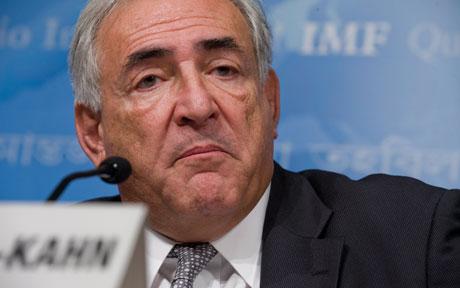
Electoral Populism in Ukraine Prevails over Economic Wisdom
Publication: Eurasia Daily Monitor Volume: 6 Issue: 203
By:

International Monetary Fund (IMF) Managing Director Dominique Strauss-Kahn on November 2 called Ukraine “a big problem” when asked about the situation in Central and Eastern Europe as the region worst hit by the global crisis. Recent steps in the economy aimed to “buy” voters ahead of the January 17, 2010 presidential election, taken by all the branches of power without exception, have jeopardized the implementation of the IMF assistance program worth $16.4 billion. Ukraine has already received over $10 billion from the IMF, but it hardly qualifies for the next $3.8 billion tranche expected in November, as it has reneged on its promises to the IMF to increase domestic gas prices and abstain from hiking pensions and wages.
A court in Kyiv on September 25 forbade the national energy regulator to increase the price of gas for heating companies by 20 percent from October 1. The court acted on a lawsuit filed by trade unions (Ukrainski Novyny, October 1). The 20 percent price hike for households from September had been outlawed by another court in August. Both court verdicts were hailed by Prime Minister Yulia Tymoshenko who, although her government promised the hikes to the IMF, is reluctant to increase domestic gas prices as this may spoil her presidential election campaign. The IMF demanded higher prices because the status quo over burdens the budget as the state-controlled Naftohaz Ukrainy oil and gas behemoth buys gas from Russia at much higher prices than those paid to Naftohaz by domestic consumers.
Instead of increasing the prices, Tymoshenko approved their lowering in her traditional electoral stronghold of Kyiv. Kyiv Mayor Leonid Chernovetsky announced on October 13 that the prices of heating and water supply would be lowered in November to their pre-June level. The prices were increased by 50 to 100 percent from June 1 and although initially many Kyiv residents refused to pay, they had to accept the new prices. Chernovetsky said that the old prices would return until around May 2010. He stated that this was possible thanks to Naftohaz Ukrainy’s consent to subsidize Kyiv. Speaking several hours before Chernovetsky, Tymoshenko had boasted that her cabinet reached an agreement with the Kyiv authorities to lower utility prices (5 Kanal TV, October 13).
On October 20, ironically when an IMF mission was in Ukraine to check whether the country qualifies for the next tranche, parliament passed a bill to increase the minimum monthly wage from the equivalent of $84 to $109 from January 1 and further in several stages to $115 from December 2010. The bill was backed by all parties except, this time, Tymoshenko’s. This was a compromise solution as the opposition Party of Regions, in order to please potential voters for its leader Viktor Yanukovych in the presidential election, insisted on more than doubling wages and pensions, threatening an open-ended blockade of parliament. Nevertheless, even such a relatively small increase was in violation of the promises that Ukraine made to the IMF. Tymoshenko called on Yushchenko to veto the law (5 Kanal TV, October 20).
A disgruntled IMF mission left Kyiv on October 24 without saying whether it would recommend that the IMF board disburse the next loan tranche as scheduled. Instead, the IMF said in its October 25 press release that the mission reached an agreement with the Ukrainian leadership on the need for “corrective actions,” including a presidential veto on the bill on higher wages and pensions which, the IMF said, was “at odds with the objectives of the authorities’ program.”
However, President Viktor Yushchenko defied the IMF on October 30 by signing the bill into law. Explaining this decision, he said that it would be “immoral” to solve state budget problems “at the expense of the retired, poor and disabled people” (UNIAN, October 30). Similar to Tymoshenko opposing higher domestic gas prices, Yushchenko’s decision was dictated by populist considerations as he will also run in the January election. Strauss-Kahn immediately reacted to Yushchenko’s decision. “I’m very worried by the president’s agreement to this bill, which puts the program we had signed off track and in this situation I am afraid it would be very difficult to complete the next review of the program,” he told Reuters on October 30.
Electoral populism clearly prevails over economic wisdom in Ukraine ahead of the presidential election. Consequently, the IMF faces a difficult choice. If Ukraine does not receive the loan tranche expected in the middle of November, its national currency, which lost some 40 percent of its value in late 2008 and early 2009, will again fall making economic recovery slower and more painful. If the IMF turns a blind eye to Kyiv’s failure to abide by its conditions, the IMF’s prestige will suffer and Ukraine’s finances will be further unbalanced prompting it to seek additional international loans, including from the IMF.




